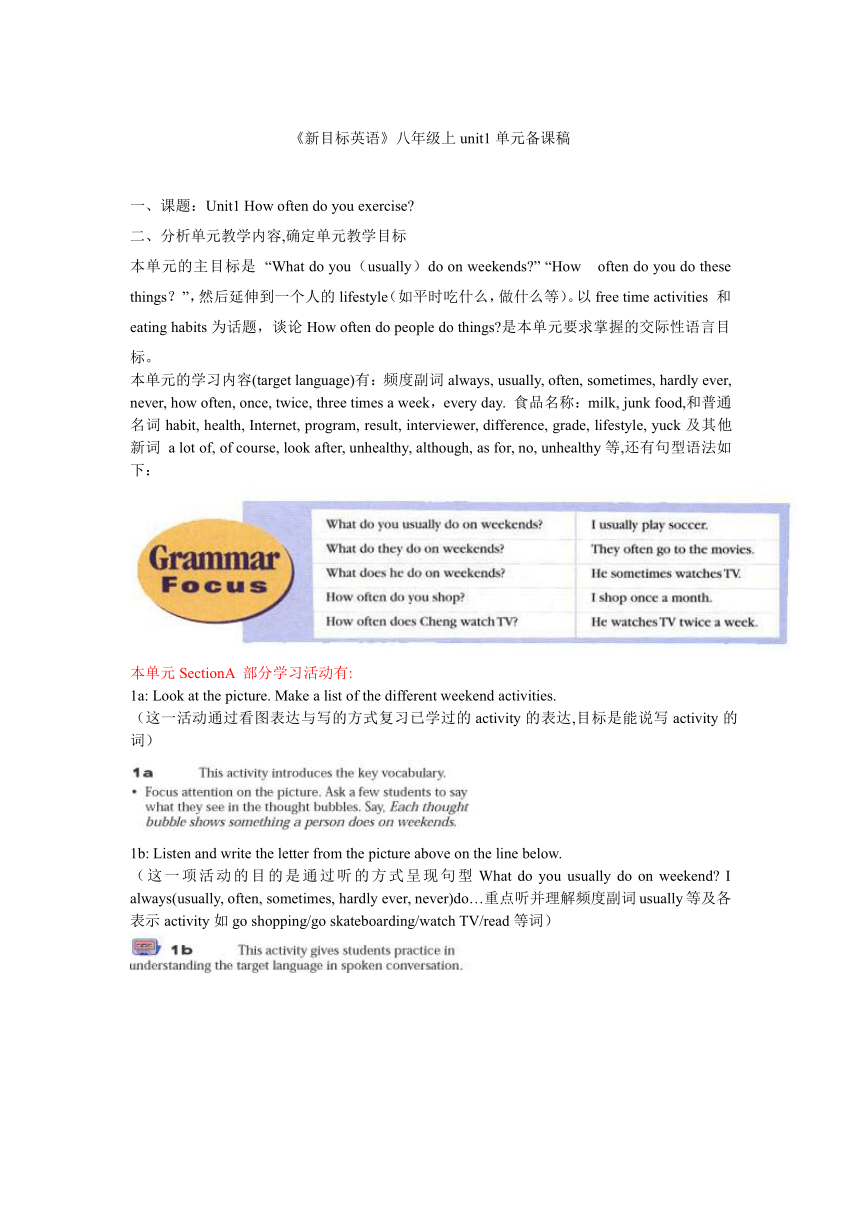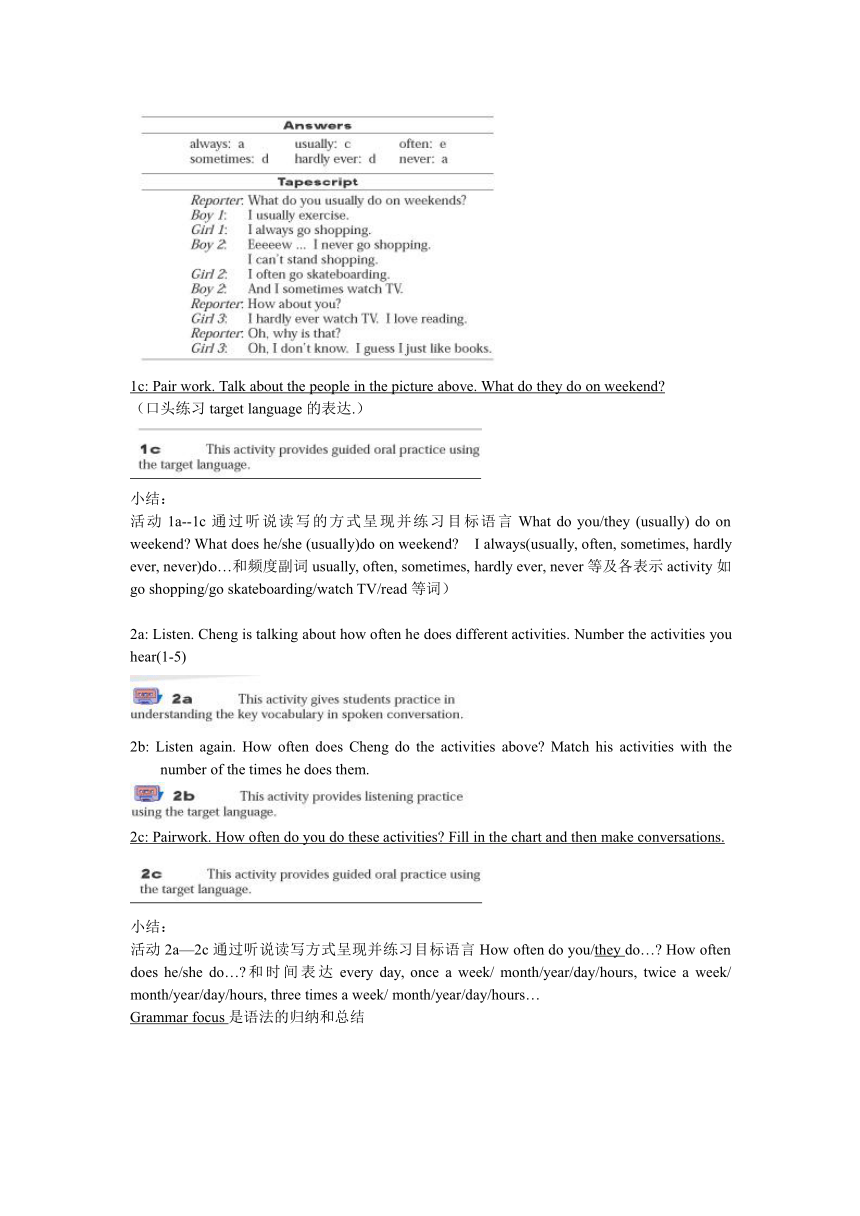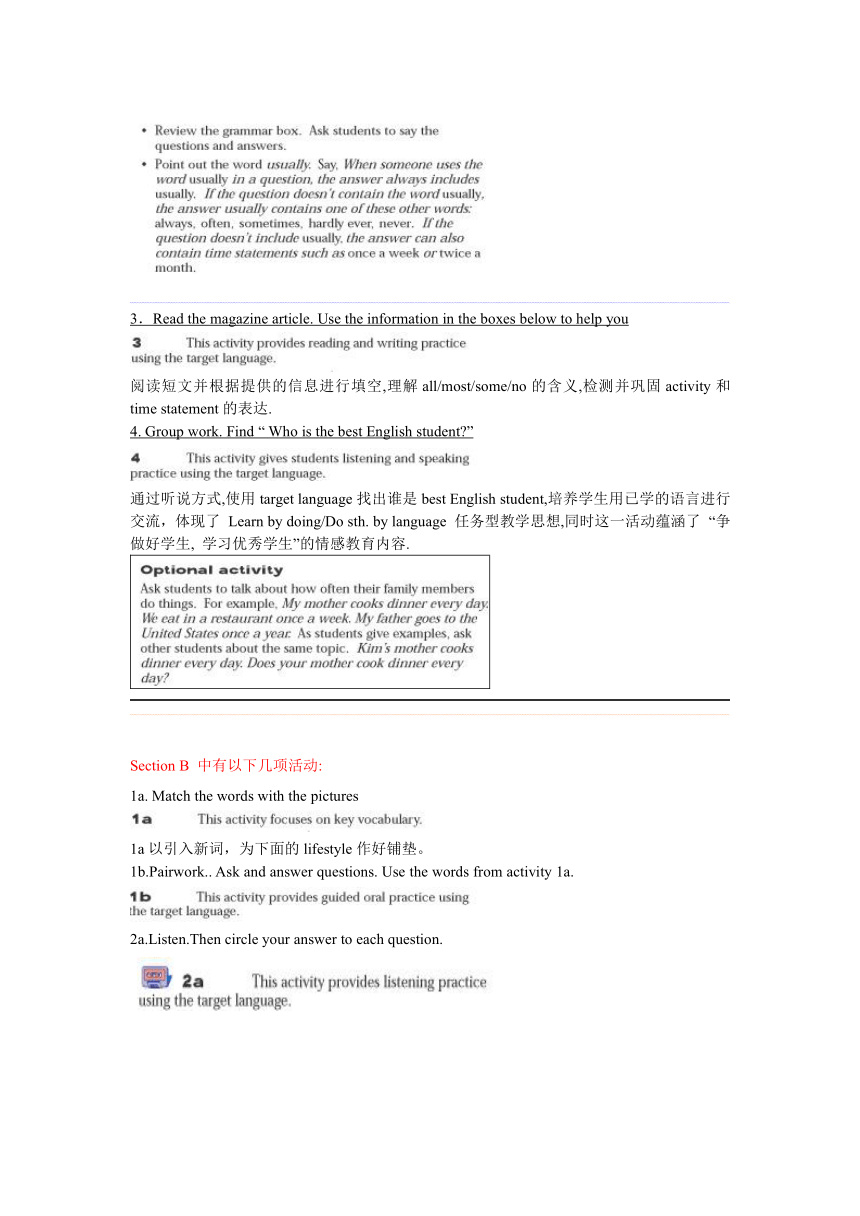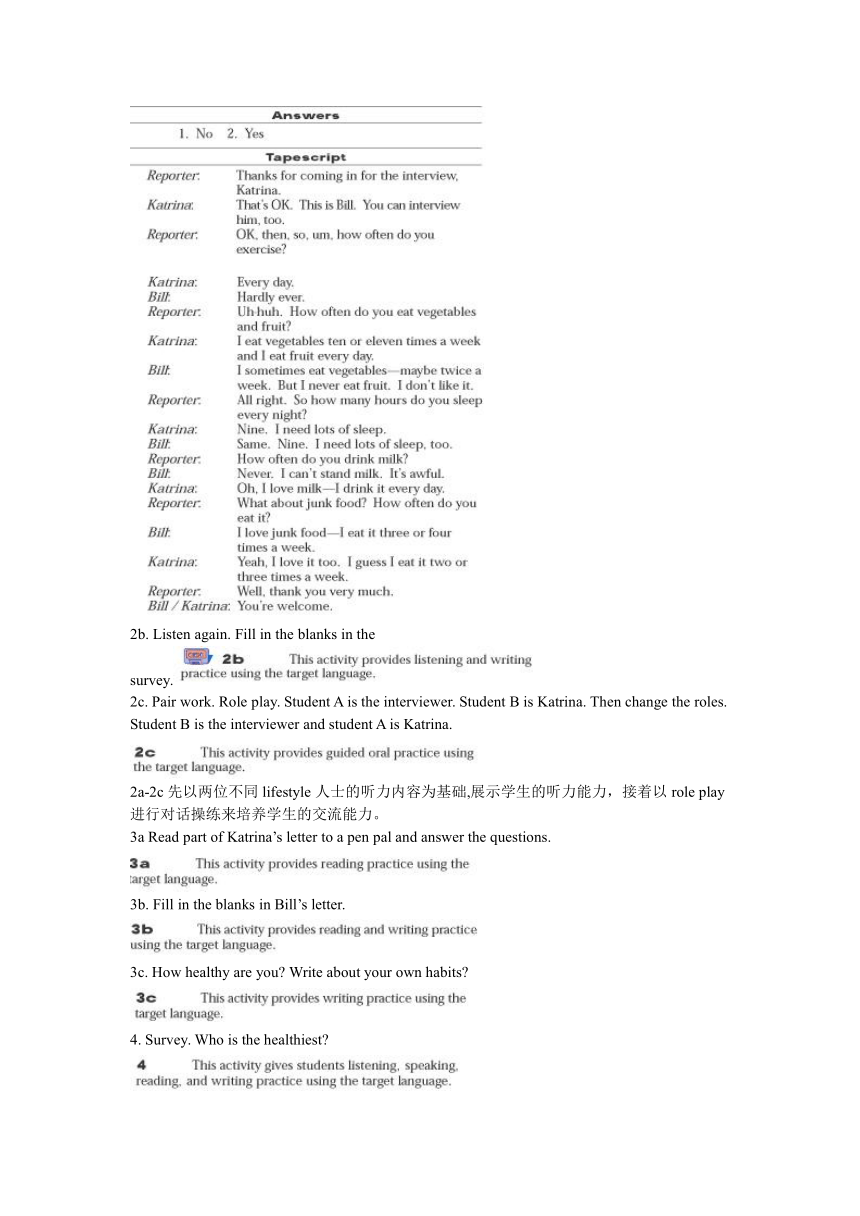unit1 How often do you exercise?[上学期]
文档属性
| 名称 | unit1 How often do you exercise?[上学期] |

|
|
| 格式 | rar | ||
| 文件大小 | 197.9KB | ||
| 资源类型 | 教案 | ||
| 版本资源 | 人教新目标(Go for it)版 | ||
| 科目 | 英语 | ||
| 更新时间 | 2007-09-26 00:00:00 | ||
图片预览




文档简介
《新目标英语》八年级上unit1单元备课稿
1、 课题:Unit1 How often do you exercise
2、 分析单元教学内容,确定单元教学目标
本单元的主目标是 “What do you(usually)do on weekends ” “How often do you do these things?”,然后延伸到一个人的lifestyle(如平时吃什么,做什么等)。以free time activities 和eating habits为话题,谈论How often do people do things 是本单元要求掌握的交际性语言目标。
本单元的学习内容(target language)有:频度副词always, usually, often, sometimes, hardly ever, never, how often, once, twice, three times a week,every day. 食品名称:milk, junk food,和普通名词habit, health, Internet, program, result, interviewer, difference, grade, lifestyle, yuck及其他新词 a lot of, of course, look after, unhealthy, although, as for, no, unhealthy等,还有句型语法如下:
本单元SectionA 部分学习活动有:
1a: Look at the picture. Make a list of the different weekend activities.
(这一活动通过看图表达与写的方式复习已学过的activity的表达,目标是能说写activity的词)
1b: Listen and write the letter from the picture above on the line below.
(这一项活动的目的是通过听的方式呈现句型What do you usually do on weekend I always(usually, often, sometimes, hardly ever, never)do…重点听并理解频度副词usually等及各表示activity如go shopping/go skateboarding/watch TV/read等词)
1c: Pair work. Talk about the people in the picture above. What do they do on weekend
(口头练习target language的表达.)
小结:
活动1a--1c通过听说读写的方式呈现并练习目标语言What do you/they (usually) do on weekend What does he/she (usually)do on weekend I always(usually, often, sometimes, hardly ever, never)do…和频度副词usually, often, sometimes, hardly ever, never等及各表示activity如go shopping/go skateboarding/watch TV/read等词)
2a: Listen. Cheng is talking about how often he does different activities. Number the activities you hear(1-5)
2b: Listen again. How often does Cheng do the activities above Match his activities with the number of the times he does them.
2c: Pairwork. How often do you do these activities Fill in the chart and then make conversations.
小结:
活动2a—2c通过听说读写方式呈现并练习目标语言How often do you/they do… How often does he/she do… 和时间表达every day, once a week/ month/year/day/hours, twice a week/ month/year/day/hours, three times a week/ month/year/day/hours…
Grammar focus是语法的归纳和总结
3.Read the magazine article. Use the information in the boxes below to help you
阅读短文并根据提供的信息进行填空,理解all/most/some/no的含义,检测并巩固activity和time statement的表达.
4. Group work. Find “ Who is the best English student ”
通过听说方式,使用target language找出谁是best English student,培养学生用已学的语言进行交流,体现了 Learn by doing/Do sth. by language 任务型教学思想,同时这一活动蕴涵了 “争做好学生, 学习优秀学生”的情感教育内容.
Section B 中有以下几项活动:
1a. Match the words with the pictures
1a以引入新词,为下面的lifestyle作好铺垫。
1b.Pairwork.. Ask and answer questions. Use the words from activity 1a.
2a.Listen.Then circle your answer to each question.
2b. Listen again. Fill in the blanks in the survey.
2c. Pair work. Role play. Student A is the interviewer. Student B is Katrina. Then change the roles. Student B is the interviewer and student A is Katrina.
2a-2c先以两位不同lifestyle人士的听力内容为基础,展示学生的听力能力,接着以role play进行对话操练来培养学生的交流能力。
3a Read part of Katrina’s letter to a pen pal and answer the questions.
3b. Fill in the blanks in Bill’s letter.
3c. How healthy are you Write about your own habits
4. Survey. Who is the healthiest
Add five questions to the survey on page 82. Then ask two classmates the questions and write down their answers. Next, tell your classmates your survey and listen to your classmates about their surveys. Take a vote: Who is the healthiest student
B部分是A部分的拓展和延伸, 如词汇的拓展,主题的延伸(activity—food),话题从活动谈到健康饮食,从而把语言目标谈论做某事的频率,结合话题活动与饮食,把主题提升为healthy lifestyle.
3、 学生学情分析(学生的知识/生活背景,学习兴趣,习惯等)确定教学重难点
本校学生大部分是来自农民家庭,家长文化素质普遍不高,没有能力也没有时间教育孩子,学习上的关心就更少了,造成相当一部分学生自由散漫的学习态度。再说小学英语没有引起学生足够的重视,缺少系统的基础知识的传授和严格规范的教育,严重阻碍了学生对英语知识的理解能力和口语表达能力的发展。结合本校学生的实际状况和新目标课程的教学目标,确定本单元的教学重难点:
教学重点:(1)了解不同的活动和食物名称,掌握常见的频度副词,如usually、always等。
(2)掌握好重点句型:What do you/they usually do on weekends?
How often does Cheng watch?
教学难点:(1)How often 句型及频度副词。
(2)如何用所学知识进行综合运用,并要求其内容的丰富性。
4、 课时划分及其教学内容
本单元划分为四个课时:
Period 1: SectionA-1a,1b,1c Period2: SectionA-2a,2b,2c,3,4
Period 3:SectionB-1a,1b,2a,2b,2c,4 Period4:SectionB-3a,3b,3c,Self-check
5、 各课时教案(配课件)
第一课时
1. 教学内容: SectionA-1a,1b,1c
2. 教学目标: In the first period students will learn some names of activities and some adverbs of frequency. These words are related to students’ daily life. They will be interested in expressing their activities on weekends.
3. 教学准备: (1)课前让学生复习已学过的活动名称。
a) (2)CAI (3)准备一些剪贴画。
4. 教学过程(课堂结构)
Step1 Warming up
1. Enjoy a broom song.
Step2 Presentation
Display a calendar that shows the days of the week. Tell students Saturday and Sunday are the weekend. Then ask Ss: What do you usually do on weekends
Step2 Practice
1. Watch a flash about exercise, then share pictures about free time activities with “What does he/she usually do on weekends ”. Teach new words.
Step3 Look, listen and write
Point to each scene in Activity1a.Ask Ss to look at each picture and tell what the person does on weekends. Then listen and write the activities on the lines below.
Step 3 Pairwork
-- What do you usually do on weekends go skateboarding
--I usually go skateboarding on weekends. watch TV
--Do you watch TV on weekends read books
--Yes, sometimes./No, I never do that. go shopping
go to the movies
play with computer
play computer games
do homework
sleep
Give them an example, then make a conversation about some activities.
Homework
Practice Section A-1b
Keep a weekend diary showing
what you do on weekend.
You can write down what they do
from the time you get up until you go to bed.
第二课时
1. 教学内容: SectionA-2a,2b,2c,3,4
2. 教学目标:The second period gives students practice in understanding the target language in spoken conversation. Ss should master “How often….. ” and some adverbs of frequency.
3. 教学准备: Preview SectionA-2a CAI
4. 教学过程:
Step1 Warming up
Enjoy “Are you sleeping” song.
Step2 Presentation
1. Show a flash to teach “sleep”. Ask “Do you usually sleep on weekends ”.
2. Show weekend activities. Let Ss work in pairs: What do they usually do on weekends ” .
3. Teach new words by asking “What do you usually do on weekends ” “How often do you do that ”
Step3 Listen and write
1. Listen and number the activities first.
2. Listen again, and match the activities of Cheng.
Step4 Oral practice
Show pictures and practice “How often do you… ” “Every day.” Let Ss say more activities.
Step5 Write
1. Read the magazine article. Fill in the blank with the information in the box. Ask Ss to finish the activity individually. This activity provides reading and writing practice using the target language.
2. Discuss with your partners your daily activities.
Step6 Group work
1. Interview in groups. “How to improve English study”.
2. Make a report :The good habit for English study
Homework
Write about how often your family members do things.
For example,
My mother cooks dinner every day.
We eat in a restaurant once a week.
My father goes to Shanghai twice a year.
……
第三课时
1. 教学内容: SectionB-1a,1b,2a,2b,2c,4
2. 教学目标: A healthy lifestyle Consolidate “How often… ”and adverbs of frequency.
3. 教学准备:Write the food they have learned or they usually like to eat.
4. 教学过程:
Step1 Warming up
Enjoy Apple song
Step2 Look and talk
1. Look at the pictures and tell if it is healthy or unhealthy food. Teach new words.
2. SectionB-1a,1b
3. Discuss “What is healthy eating ”
Step3 Listen, write and speak
Listen and fill in the chart.
Step4 Practice
1. Read about each person. Then circle “Healthy” or “unhealthy”.
2. Look and imagine what his or her lifestyle is like. Try to use some of the words below:
often every day usually once a week sometimes always never three times a week hardly ever…
3. Compare with bad habits.
Step5 Discussion
A healthy lifestyle is about a healthy diet, exercise…
Homework
Interview your favorite teacher about
lifestyle, then write an article:
My favorite teacher
第四课时
1. 教学内容: :Section B-3a,3b,3c,Self-check
2. 教学目标: Writing practice and communicative.
3. 教学准备:Revise the knowledge they have learned.
4. 教学过程:
Step1 Revision
Self-check-1
Step2.Read and write
Section B-3a,3b
Step3 Watch
Just for fun!
Homework
How healthy are you Write about your own habits.
4. 单元自我评价表及复习巩固练习
1.单元自我评价表例:
表1
学生自我检查评价表Unit1 日期:
姓名 班级 学号
检查评价内容 Yes No Score
我会读、能听懂下列的单词和词组:……
我已掌握了下列的单词、词组(习惯用语)和句型……
我能在实际情景中运用上述的单词、词组(习惯用语)和句型
我的得分是: 。我准备 来改善提高我的学习效果。
表2
学生自我检查评价表Unit2 日期:
姓名 班级 学号
自我检查评价
1、我会读、能听懂下列的单词和词组: 1、我还不会读、不能听懂下列的单词和词组:
2、我已掌握了下列的单词、词组(习惯用语)和句型 2、我已掌握了下列的单词、词组(习惯用语)和句型
能在实际情景中运用上述的单词、词组(习惯用语)和句型 能在实际情景中运用上述的单词、词组(习惯用语)和句型
我准备 来改善提高我的学习效率。
C:\Documents and Settings\wyl\桌面\Unit-1 课件 ( C:\\Documents and Settings\\wyl\\桌面\\Unit-1 课件 )G:\8-test-1 ( G:\\8-test-1 )
1、 课题:Unit1 How often do you exercise
2、 分析单元教学内容,确定单元教学目标
本单元的主目标是 “What do you(usually)do on weekends ” “How often do you do these things?”,然后延伸到一个人的lifestyle(如平时吃什么,做什么等)。以free time activities 和eating habits为话题,谈论How often do people do things 是本单元要求掌握的交际性语言目标。
本单元的学习内容(target language)有:频度副词always, usually, often, sometimes, hardly ever, never, how often, once, twice, three times a week,every day. 食品名称:milk, junk food,和普通名词habit, health, Internet, program, result, interviewer, difference, grade, lifestyle, yuck及其他新词 a lot of, of course, look after, unhealthy, although, as for, no, unhealthy等,还有句型语法如下:
本单元SectionA 部分学习活动有:
1a: Look at the picture. Make a list of the different weekend activities.
(这一活动通过看图表达与写的方式复习已学过的activity的表达,目标是能说写activity的词)
1b: Listen and write the letter from the picture above on the line below.
(这一项活动的目的是通过听的方式呈现句型What do you usually do on weekend I always(usually, often, sometimes, hardly ever, never)do…重点听并理解频度副词usually等及各表示activity如go shopping/go skateboarding/watch TV/read等词)
1c: Pair work. Talk about the people in the picture above. What do they do on weekend
(口头练习target language的表达.)
小结:
活动1a--1c通过听说读写的方式呈现并练习目标语言What do you/they (usually) do on weekend What does he/she (usually)do on weekend I always(usually, often, sometimes, hardly ever, never)do…和频度副词usually, often, sometimes, hardly ever, never等及各表示activity如go shopping/go skateboarding/watch TV/read等词)
2a: Listen. Cheng is talking about how often he does different activities. Number the activities you hear(1-5)
2b: Listen again. How often does Cheng do the activities above Match his activities with the number of the times he does them.
2c: Pairwork. How often do you do these activities Fill in the chart and then make conversations.
小结:
活动2a—2c通过听说读写方式呈现并练习目标语言How often do you/they do… How often does he/she do… 和时间表达every day, once a week/ month/year/day/hours, twice a week/ month/year/day/hours, three times a week/ month/year/day/hours…
Grammar focus是语法的归纳和总结
3.Read the magazine article. Use the information in the boxes below to help you
阅读短文并根据提供的信息进行填空,理解all/most/some/no的含义,检测并巩固activity和time statement的表达.
4. Group work. Find “ Who is the best English student ”
通过听说方式,使用target language找出谁是best English student,培养学生用已学的语言进行交流,体现了 Learn by doing/Do sth. by language 任务型教学思想,同时这一活动蕴涵了 “争做好学生, 学习优秀学生”的情感教育内容.
Section B 中有以下几项活动:
1a. Match the words with the pictures
1a以引入新词,为下面的lifestyle作好铺垫。
1b.Pairwork.. Ask and answer questions. Use the words from activity 1a.
2a.Listen.Then circle your answer to each question.
2b. Listen again. Fill in the blanks in the survey.
2c. Pair work. Role play. Student A is the interviewer. Student B is Katrina. Then change the roles. Student B is the interviewer and student A is Katrina.
2a-2c先以两位不同lifestyle人士的听力内容为基础,展示学生的听力能力,接着以role play进行对话操练来培养学生的交流能力。
3a Read part of Katrina’s letter to a pen pal and answer the questions.
3b. Fill in the blanks in Bill’s letter.
3c. How healthy are you Write about your own habits
4. Survey. Who is the healthiest
Add five questions to the survey on page 82. Then ask two classmates the questions and write down their answers. Next, tell your classmates your survey and listen to your classmates about their surveys. Take a vote: Who is the healthiest student
B部分是A部分的拓展和延伸, 如词汇的拓展,主题的延伸(activity—food),话题从活动谈到健康饮食,从而把语言目标谈论做某事的频率,结合话题活动与饮食,把主题提升为healthy lifestyle.
3、 学生学情分析(学生的知识/生活背景,学习兴趣,习惯等)确定教学重难点
本校学生大部分是来自农民家庭,家长文化素质普遍不高,没有能力也没有时间教育孩子,学习上的关心就更少了,造成相当一部分学生自由散漫的学习态度。再说小学英语没有引起学生足够的重视,缺少系统的基础知识的传授和严格规范的教育,严重阻碍了学生对英语知识的理解能力和口语表达能力的发展。结合本校学生的实际状况和新目标课程的教学目标,确定本单元的教学重难点:
教学重点:(1)了解不同的活动和食物名称,掌握常见的频度副词,如usually、always等。
(2)掌握好重点句型:What do you/they usually do on weekends?
How often does Cheng watch?
教学难点:(1)How often 句型及频度副词。
(2)如何用所学知识进行综合运用,并要求其内容的丰富性。
4、 课时划分及其教学内容
本单元划分为四个课时:
Period 1: SectionA-1a,1b,1c Period2: SectionA-2a,2b,2c,3,4
Period 3:SectionB-1a,1b,2a,2b,2c,4 Period4:SectionB-3a,3b,3c,Self-check
5、 各课时教案(配课件)
第一课时
1. 教学内容: SectionA-1a,1b,1c
2. 教学目标: In the first period students will learn some names of activities and some adverbs of frequency. These words are related to students’ daily life. They will be interested in expressing their activities on weekends.
3. 教学准备: (1)课前让学生复习已学过的活动名称。
a) (2)CAI (3)准备一些剪贴画。
4. 教学过程(课堂结构)
Step1 Warming up
1. Enjoy a broom song.
Step2 Presentation
Display a calendar that shows the days of the week. Tell students Saturday and Sunday are the weekend. Then ask Ss: What do you usually do on weekends
Step2 Practice
1. Watch a flash about exercise, then share pictures about free time activities with “What does he/she usually do on weekends ”. Teach new words.
Step3 Look, listen and write
Point to each scene in Activity1a.Ask Ss to look at each picture and tell what the person does on weekends. Then listen and write the activities on the lines below.
Step 3 Pairwork
-- What do you usually do on weekends go skateboarding
--I usually go skateboarding on weekends. watch TV
--Do you watch TV on weekends read books
--Yes, sometimes./No, I never do that. go shopping
go to the movies
play with computer
play computer games
do homework
sleep
Give them an example, then make a conversation about some activities.
Homework
Practice Section A-1b
Keep a weekend diary showing
what you do on weekend.
You can write down what they do
from the time you get up until you go to bed.
第二课时
1. 教学内容: SectionA-2a,2b,2c,3,4
2. 教学目标:The second period gives students practice in understanding the target language in spoken conversation. Ss should master “How often….. ” and some adverbs of frequency.
3. 教学准备: Preview SectionA-2a CAI
4. 教学过程:
Step1 Warming up
Enjoy “Are you sleeping” song.
Step2 Presentation
1. Show a flash to teach “sleep”. Ask “Do you usually sleep on weekends ”.
2. Show weekend activities. Let Ss work in pairs: What do they usually do on weekends ” .
3. Teach new words by asking “What do you usually do on weekends ” “How often do you do that ”
Step3 Listen and write
1. Listen and number the activities first.
2. Listen again, and match the activities of Cheng.
Step4 Oral practice
Show pictures and practice “How often do you… ” “Every day.” Let Ss say more activities.
Step5 Write
1. Read the magazine article. Fill in the blank with the information in the box. Ask Ss to finish the activity individually. This activity provides reading and writing practice using the target language.
2. Discuss with your partners your daily activities.
Step6 Group work
1. Interview in groups. “How to improve English study”.
2. Make a report :The good habit for English study
Homework
Write about how often your family members do things.
For example,
My mother cooks dinner every day.
We eat in a restaurant once a week.
My father goes to Shanghai twice a year.
……
第三课时
1. 教学内容: SectionB-1a,1b,2a,2b,2c,4
2. 教学目标: A healthy lifestyle Consolidate “How often… ”and adverbs of frequency.
3. 教学准备:Write the food they have learned or they usually like to eat.
4. 教学过程:
Step1 Warming up
Enjoy Apple song
Step2 Look and talk
1. Look at the pictures and tell if it is healthy or unhealthy food. Teach new words.
2. SectionB-1a,1b
3. Discuss “What is healthy eating ”
Step3 Listen, write and speak
Listen and fill in the chart.
Step4 Practice
1. Read about each person. Then circle “Healthy” or “unhealthy”.
2. Look and imagine what his or her lifestyle is like. Try to use some of the words below:
often every day usually once a week sometimes always never three times a week hardly ever…
3. Compare with bad habits.
Step5 Discussion
A healthy lifestyle is about a healthy diet, exercise…
Homework
Interview your favorite teacher about
lifestyle, then write an article:
My favorite teacher
第四课时
1. 教学内容: :Section B-3a,3b,3c,Self-check
2. 教学目标: Writing practice and communicative.
3. 教学准备:Revise the knowledge they have learned.
4. 教学过程:
Step1 Revision
Self-check-1
Step2.Read and write
Section B-3a,3b
Step3 Watch
Just for fun!
Homework
How healthy are you Write about your own habits.
4. 单元自我评价表及复习巩固练习
1.单元自我评价表例:
表1
学生自我检查评价表Unit1 日期:
姓名 班级 学号
检查评价内容 Yes No Score
我会读、能听懂下列的单词和词组:……
我已掌握了下列的单词、词组(习惯用语)和句型……
我能在实际情景中运用上述的单词、词组(习惯用语)和句型
我的得分是: 。我准备 来改善提高我的学习效果。
表2
学生自我检查评价表Unit2 日期:
姓名 班级 学号
自我检查评价
1、我会读、能听懂下列的单词和词组: 1、我还不会读、不能听懂下列的单词和词组:
2、我已掌握了下列的单词、词组(习惯用语)和句型 2、我已掌握了下列的单词、词组(习惯用语)和句型
能在实际情景中运用上述的单词、词组(习惯用语)和句型 能在实际情景中运用上述的单词、词组(习惯用语)和句型
我准备 来改善提高我的学习效率。
C:\Documents and Settings\wyl\桌面\Unit-1 课件 ( C:\\Documents and Settings\\wyl\\桌面\\Unit-1 课件 )G:\8-test-1 ( G:\\8-test-1 )
同课章节目录
- Unit 1 Where did you go on vacation?
- Section A
- Section B
- Unit 2 How often do you exercise?
- Section A
- Section B
- Unit 3 I'm more outgoing than my sister.
- Section A
- Section B
- Unit 4 What's the best movie theater?
- Section A
- Section B
- Unit 5 Do you want to watch a game show?
- Section A
- Section B
- Unit 6 I'm going to study computer science.
- Section A
- Section B
- Unit 7 Will people have robots?
- Section A
- Section B
- Unit 8 How do you make a banana milk shake?
- Section A
- Section B
- Unit 9 Can you come to my party?
- Section A
- Section B
- Unit 10 If you go to the party, you'll have a grea
- Section A
- Section B
